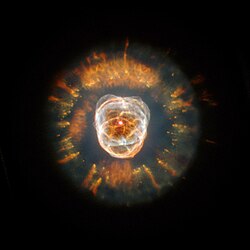NGC 2392
| Nebula | |
|---|---|

|
|
| Observation data: J2000 epoch | |
| Right ascension | 07h 29m 10.7669s |
| Declination | +20° 54′ 42.488″ |
| Distance | ≥2,870 ly (≥880 pc) ly |
| Apparent magnitude (V) | 10.1 |
| Apparent dimensions (V) | 48″; × 48″; |
| Constellation | Gemini |
| Physical characteristics | |
| Radius | ≥0.34 ly ly |
| Absolute magnitude (V) | ≤0.4 |
| Notable features | – |
| Designations | NGC 2392,Caldwell 39, Clown Nebula, Clown Face |
The Eskimo Nebula (NGC 2392), also known as the Clownface Nebula or Caldwell 39, is a bipolar double-shellplanetary nebula (PN). It was discovered by astronomer William Herschel in 1787. The formation resembles a person's head surrounded by a parka hood. It is surrounded by gas that composed the outer layers of a Sun-like star. The visible inner filaments are ejected by a strong wind of particles from the central star. The outer disk contains unusual light-year-long filaments.
NGC 2392 lies more than 2,870 light-years away and is visible with a small telescope in the constellation of Gemini.
The nebula was discovered by William Herschel on January 17, 1787, in Slough, England. He described it as "A star 9th magnitude with a pretty bright middle, nebulosity equally dispersed all around. A very remarkable phenomenon." NGC 2392 WH IV-45 is included in the Astronomical League's Herschel 400 observing program.
Coordinates: ![]() 07h 29m 10.7669s, +20° 54′ 42.488″
07h 29m 10.7669s, +20° 54′ 42.488″
...
Wikipedia
